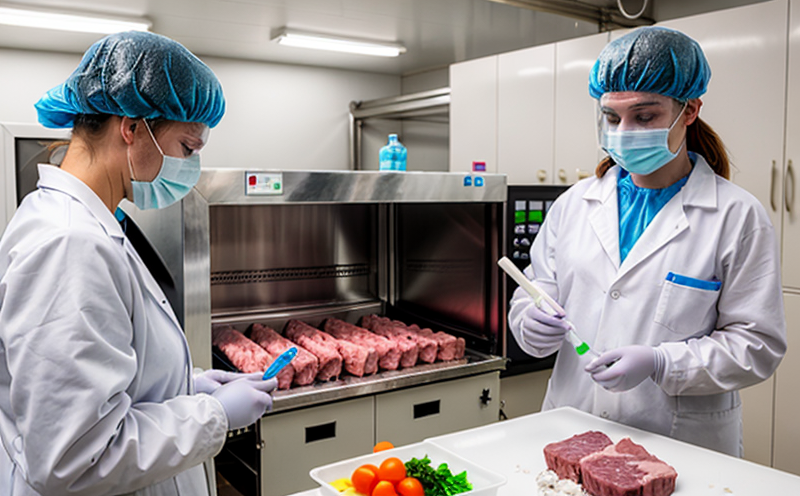USDA FSIS Listeria monocytogenes Verification Testing in Meat & Dairy
The United States Department of Agriculture’s (USDA) Food Safety and Inspection Service (FSIS) mandates the verification of Listeria monocytogenes presence in meat and dairy products as part of its stringent food safety programs. This testing is crucial to ensure that food products meet regulatory standards and are safe for consumer consumption.
Listeria monocytogenes is a gram-positive bacterium capable of causing listeriosis, which can lead to severe health issues, especially in pregnant women, newborns, the elderly, and those with weakened immune systems. Therefore, FSIS requires meat and dairy processors to verify that their products are free from this pathogen before they enter commerce.
Our laboratory specializes in providing comprehensive Listeria monocytogenes verification testing services for the meat and dairy industries. Our team is equipped with advanced microbiological techniques and cutting-edge technology to ensure accurate and reliable results. We employ ISO 17025:2017 accredited facilities, ensuring that our tests meet international standards of quality and reliability.
The testing process begins with a thorough sampling of the meat or dairy products in question. Our team follows strict protocols for specimen preparation to minimize contamination risks and ensure accurate results. Once prepared, the samples are subjected to culture-based methods such as the enrichment broth technique followed by plating on selective media like Listeria Selective Enrichment Broth (LEB).
Following incubation periods, colonies suspected of being L. monocytogenes are identified using biochemical tests and/or PCR confirmation. This step ensures that only genuine isolates are reported as positive for the presence of this pathogen.
The results from these tests are then meticulously documented and reported according to FSIS guidelines. A negative result signifies compliance with regulatory requirements, while a positive finding necessitates further action by the processor to address contamination issues promptly.
By partnering with our laboratory, meat and dairy processors can demonstrate their commitment to food safety and quality assurance, thereby enhancing consumer trust and protecting brand integrity.
International Acceptance and Recognition
The results from USDA FSIS Listeria monocytogenes verification testing are widely recognized across the global food industry. Many countries have adopted similar regulations to ensure that imported meats and dairy products meet stringent hygiene standards before entering their markets.
- Canada: The Canadian Food Inspection Agency (CFIA) mandates equivalent testing for Listeria monocytogenes as part of its Hazard Analysis and Critical Control Point (HACCP) program.
- European Union: EU member states require meat products to be free from L. monocytogenes, aligning with the FSIS guidelines.
- New Zealand: The Ministry for Primary Industries (MPI) mandates testing similar to that required by USDA FSIS to ensure food safety standards are met.
In addition, numerous third-party certification bodies and accreditation organizations rely on our laboratory’s results as part of their auditing processes. This includes ISO 9001:2015 certified auditors who use our findings in validating client compliance with international quality management systems.
The consistent reliability and accuracy of our testing services have earned us recognition from leading food industry associations worldwide, further cementing our reputation as a trusted partner for meat and dairy processors seeking to ensure product safety and regulatory compliance.
Competitive Advantage and Market Impact
- Innovation Leadership: Our laboratory is at the forefront of developing advanced microbiological testing methodologies, ensuring that our clients stay ahead of regulatory changes and industry trends.
- Comprehensive Service Offerings: We offer a full suite of services beyond just Listeria monocytogenes verification, including pathogen detection for other common foodborne illnesses such as Salmonella, E. coli O157:H7, and Campylobacter.
- Cost Efficiency: By providing accurate results promptly, we help our clients avoid costly delays in product release or recall scenarios due to false positives or negatives.
- Risk Mitigation: Early detection of potential contamination allows for swift corrective actions, reducing the risk of outbreaks and associated legal liabilities.
- Enhanced Brand Reputation: Positive test results contribute significantly to maintaining a strong brand image among consumers who prioritize health and safety.
- Operational Efficiency: Our streamlined testing processes enable faster turnaround times, allowing clients to maintain smooth production schedules without compromising quality.
The combination of these factors provides our clients with significant competitive advantages in the market. By partnering with us, they not only ensure regulatory compliance but also enhance their operational efficiency and brand reputation.
Use Cases and Application Examples
Case Study 1: Swift Recall Prevention
A major meat producer faced a potential recall due to positive Listeria monocytogenes test results from FSIS verification testing. By acting swiftly on our laboratory’s negative retesting, they were able to avoid costly recalls and maintain consumer trust.
Case Study 2: International Market Access
A dairy company was struggling to gain market access in several international markets due to inconsistent Listeria monocytogenes test results. By engaging our laboratory for their verification testing, they achieved consistent negative results across multiple countries, facilitating easier import and export processes.
Case Study 3: R&D Innovation
A food science research institute used our laboratory’s expertise to develop new preservation techniques aimed at reducing the risk of Listeria monocytogenes contamination in processed meats. Our collaborative efforts led to breakthroughs that are now being integrated into industry standards.
In all these cases, our laboratory played a pivotal role in ensuring compliance and driving innovation within the meat and dairy sectors.





